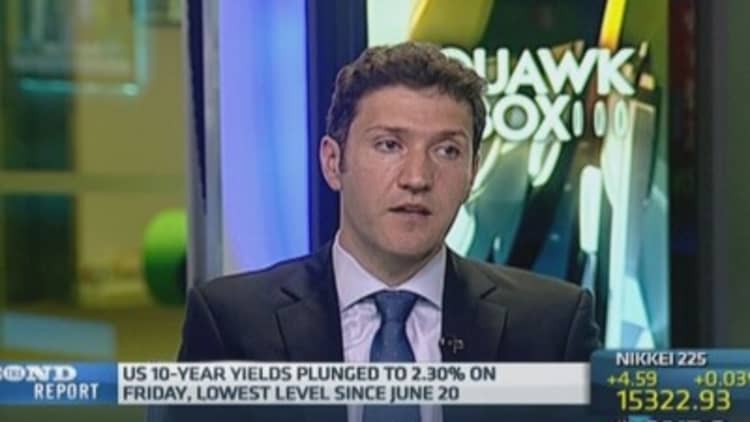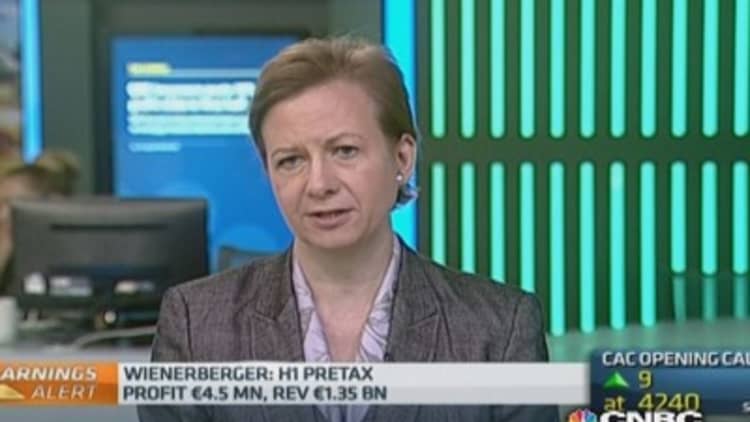Ireland's cost of borrowing hit a new record-low on Tuesday, as investors mulled whether bonds from peripheral euro zone countries were overpriced.
Euro zone government bond yields have been on a broadly downward slide since European Central Bank (ECB) President Mario Draghi pledged to do "whatever it takes" to save the euro from collapse back in 2012.
This June, borrowing costs—particularly for the less-robust "peripheral countries"—took a further tumble after Draghi announced multiple measures to boost the region's growth prospects, including introducing negative rates on the ECB deposit facility.
Spain and Italy now have 10-year yields close to those of the U.S.—even though the latter's economic recovery seems stronger on many metrics. Spanish and Italian debt yielded 2.44 percent and 2.61 percent respectively on Tuesday, while the yield on 10-year U.S. Treasurys was at 2.39 percent.
Less than four years after Ireland's financial bailout, the country's 10-year debt now yields less than its U.S. equivalent, hitting a new low of 1.93 percent on Tuesday after Moody's Investors Service upgraded Ireland's credit rating to "A minus".

This seemingly endless spiral lower in borrowing costs for countries which still face multiple economic hurdles—including uncompetitive labor markets, political instability and low domestic demand—has raised concerns that the peripheral debt market is heading for a fall.
"Our model indicates that European bonds are no longer cheap, and points to overvaluation in dollars," Alberto Gallo, head of macro credit research at RBS, said in a note on Friday. He advised portfolio managers invested in Europe, including peripheral countries, to adopt a "more neutral stance".
According to Dealogic, peripheral euro zone bond issuance is at its highest level for the year-to-date since 2009, when the extent of the region's debt crisis first emerged.
'Setback potential'
Gallo isn't the only one who is concerned. Jens Weidmann, head of Germany's central bank, warned in June that valuations appeared to be "running ahead of the adjustment process".
"The current long-term yields on some European government bonds already appear to have factored in the required adjustment to a large extent. This, however, creates a setback potential," he said in a speech at an economic conference.
More recently however, Luca Jellinek, head of European rates strategy at Credit Agricole, said low yields were a fair reflection of the euro zone's subdued interest rate environment—and the perception that rates would not be raised in the foreseeable future.
The ECB cut its main interest rate to a new-record low of 0.15 percent in June, in response to concerns about the impact on economic growth from the region's long-term low inflation.
"What we are witnessing in Europe now is people speculating—or becoming convinced—that there is no interest rate cycle and that the European Central Bank can't hike for an indefinite period of time," Jellinek told CNBC on Friday.
He added that those confident the region would avoid another sovereign debt crisis should stay invested.
"I think the periphery is still interesting, although there will be a lot of noise around the figures—obviously, very low growth is not good for the periphery," Jellinek told CNBC.
With regards to bubble fears, Lloyds credit strategist Alan Capper said euro zone government and investment grade debt was definitely not in a bubble, but that the case was less clear-cut for high yield or "junk" credit.
"High yield is much closer to bubble territory—this is where you could see the risk of an unwind happening. If you saw many years of slow growth that could be damaging to market," he told CNBC on Tuesday.
ECB QE?
RBS' Gallo said that investors were overconfident the ECB would embark on an asset-purchasing program either this year or next, following in the footsteps of the Bank of England, the Federal Reserve and the Bank of Japan.
"Flat growth and near-zero inflation is not a catastrophe for credit, which can still perform well unless there's a recession or a serious deflationary threat. But the market is putting too much hope in quantitative easing and I don't like it," he said.

Draghi reiterated at his latest monthly news conferences that the Bank remains open to purchasing government bonds—also known as quantitative easing or QE—if needed to boost inflation.
Economists think there is a one-in-three chance the ECB will embark on an asset-purchasing program in 2015, according to a Reuters poll, with QE in 2014 viewed as a half as likely.
—By CNBC's Katy Barnato


